Analyzing Coca-Cola's Global Business Environment in India
VerifiedAdded on 2022/08/29
|10
|2966
|25
Report
AI Summary
This report offers a detailed analysis of Coca-Cola's operations within the global business environment, specifically focusing on the Indian market. It examines the impact of globalization, political and economic systems, cultural factors, free trade policies, protectionism, and ethical considerations on Coca-Cola's business strategies. The report highlights the challenges posed by cultural differences, purchasing behavior, and stakeholder management, while also emphasizing the importance of free trade policies and the implications of protectionist measures. Furthermore, it addresses ethical issues faced by multinational companies, including corporate social responsibility initiatives undertaken by Coca-Cola in India, such as water sustainability, solar energy projects, and sustainable agriculture. The report concludes with recommendations regarding the intricacies of the legal environment and offers insights into navigating the complexities of the Indian market.
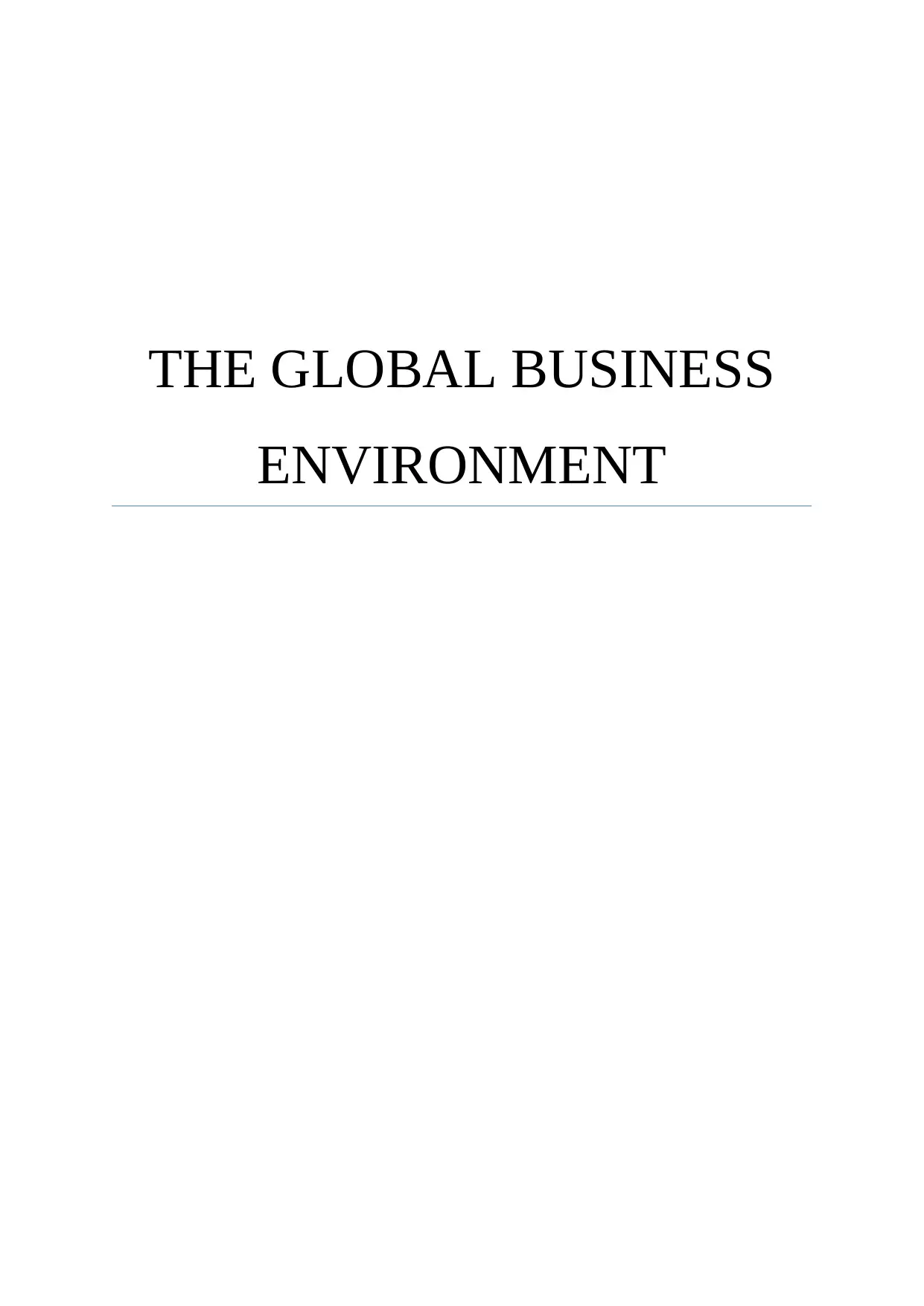
THE GLOBAL BUSINESS
ENVIRONMENT
ENVIRONMENT
Paraphrase This Document
Need a fresh take? Get an instant paraphrase of this document with our AI Paraphraser
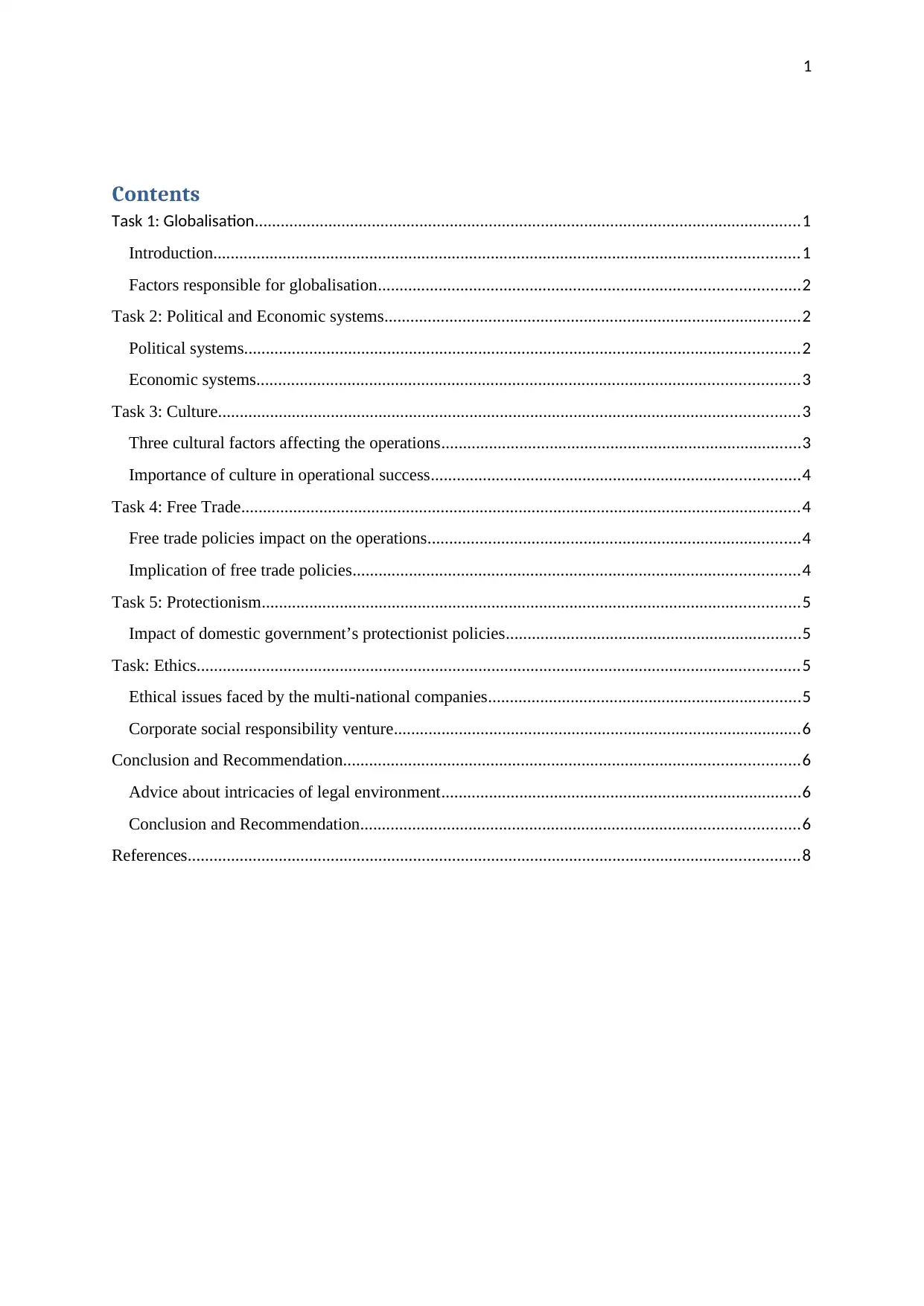
1
Contents
Task 1: Globalisation..............................................................................................................................1
Introduction.......................................................................................................................................1
Factors responsible for globalisation.................................................................................................2
Task 2: Political and Economic systems................................................................................................2
Political systems................................................................................................................................2
Economic systems.............................................................................................................................3
Task 3: Culture......................................................................................................................................3
Three cultural factors affecting the operations...................................................................................3
Importance of culture in operational success.....................................................................................4
Task 4: Free Trade.................................................................................................................................4
Free trade policies impact on the operations......................................................................................4
Implication of free trade policies.......................................................................................................4
Task 5: Protectionism............................................................................................................................5
Impact of domestic government’s protectionist policies....................................................................5
Task: Ethics...........................................................................................................................................5
Ethical issues faced by the multi-national companies........................................................................5
Corporate social responsibility venture..............................................................................................6
Conclusion and Recommendation.........................................................................................................6
Advice about intricacies of legal environment...................................................................................6
Conclusion and Recommendation.....................................................................................................6
References.............................................................................................................................................8
Contents
Task 1: Globalisation..............................................................................................................................1
Introduction.......................................................................................................................................1
Factors responsible for globalisation.................................................................................................2
Task 2: Political and Economic systems................................................................................................2
Political systems................................................................................................................................2
Economic systems.............................................................................................................................3
Task 3: Culture......................................................................................................................................3
Three cultural factors affecting the operations...................................................................................3
Importance of culture in operational success.....................................................................................4
Task 4: Free Trade.................................................................................................................................4
Free trade policies impact on the operations......................................................................................4
Implication of free trade policies.......................................................................................................4
Task 5: Protectionism............................................................................................................................5
Impact of domestic government’s protectionist policies....................................................................5
Task: Ethics...........................................................................................................................................5
Ethical issues faced by the multi-national companies........................................................................5
Corporate social responsibility venture..............................................................................................6
Conclusion and Recommendation.........................................................................................................6
Advice about intricacies of legal environment...................................................................................6
Conclusion and Recommendation.....................................................................................................6
References.............................................................................................................................................8
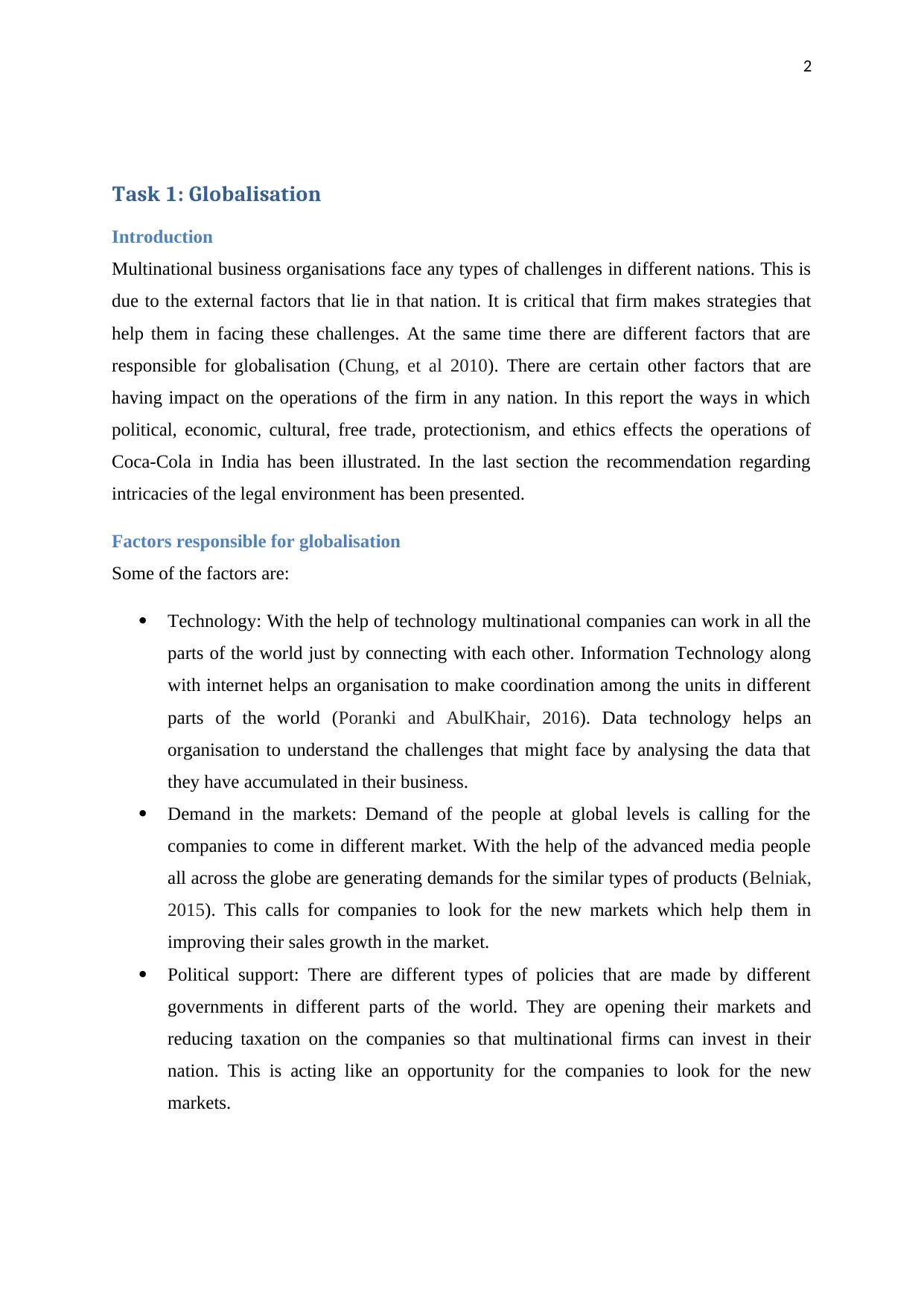
2
Task 1: Globalisation
Introduction
Multinational business organisations face any types of challenges in different nations. This is
due to the external factors that lie in that nation. It is critical that firm makes strategies that
help them in facing these challenges. At the same time there are different factors that are
responsible for globalisation (Chung, et al 2010). There are certain other factors that are
having impact on the operations of the firm in any nation. In this report the ways in which
political, economic, cultural, free trade, protectionism, and ethics effects the operations of
Coca-Cola in India has been illustrated. In the last section the recommendation regarding
intricacies of the legal environment has been presented.
Factors responsible for globalisation
Some of the factors are:
Technology: With the help of technology multinational companies can work in all the
parts of the world just by connecting with each other. Information Technology along
with internet helps an organisation to make coordination among the units in different
parts of the world (Poranki and AbulKhair, 2016). Data technology helps an
organisation to understand the challenges that might face by analysing the data that
they have accumulated in their business.
Demand in the markets: Demand of the people at global levels is calling for the
companies to come in different market. With the help of the advanced media people
all across the globe are generating demands for the similar types of products (Belniak,
2015). This calls for companies to look for the new markets which help them in
improving their sales growth in the market.
Political support: There are different types of policies that are made by different
governments in different parts of the world. They are opening their markets and
reducing taxation on the companies so that multinational firms can invest in their
nation. This is acting like an opportunity for the companies to look for the new
markets.
Task 1: Globalisation
Introduction
Multinational business organisations face any types of challenges in different nations. This is
due to the external factors that lie in that nation. It is critical that firm makes strategies that
help them in facing these challenges. At the same time there are different factors that are
responsible for globalisation (Chung, et al 2010). There are certain other factors that are
having impact on the operations of the firm in any nation. In this report the ways in which
political, economic, cultural, free trade, protectionism, and ethics effects the operations of
Coca-Cola in India has been illustrated. In the last section the recommendation regarding
intricacies of the legal environment has been presented.
Factors responsible for globalisation
Some of the factors are:
Technology: With the help of technology multinational companies can work in all the
parts of the world just by connecting with each other. Information Technology along
with internet helps an organisation to make coordination among the units in different
parts of the world (Poranki and AbulKhair, 2016). Data technology helps an
organisation to understand the challenges that might face by analysing the data that
they have accumulated in their business.
Demand in the markets: Demand of the people at global levels is calling for the
companies to come in different market. With the help of the advanced media people
all across the globe are generating demands for the similar types of products (Belniak,
2015). This calls for companies to look for the new markets which help them in
improving their sales growth in the market.
Political support: There are different types of policies that are made by different
governments in different parts of the world. They are opening their markets and
reducing taxation on the companies so that multinational firms can invest in their
nation. This is acting like an opportunity for the companies to look for the new
markets.
⊘ This is a preview!⊘
Do you want full access?
Subscribe today to unlock all pages.

Trusted by 1+ million students worldwide
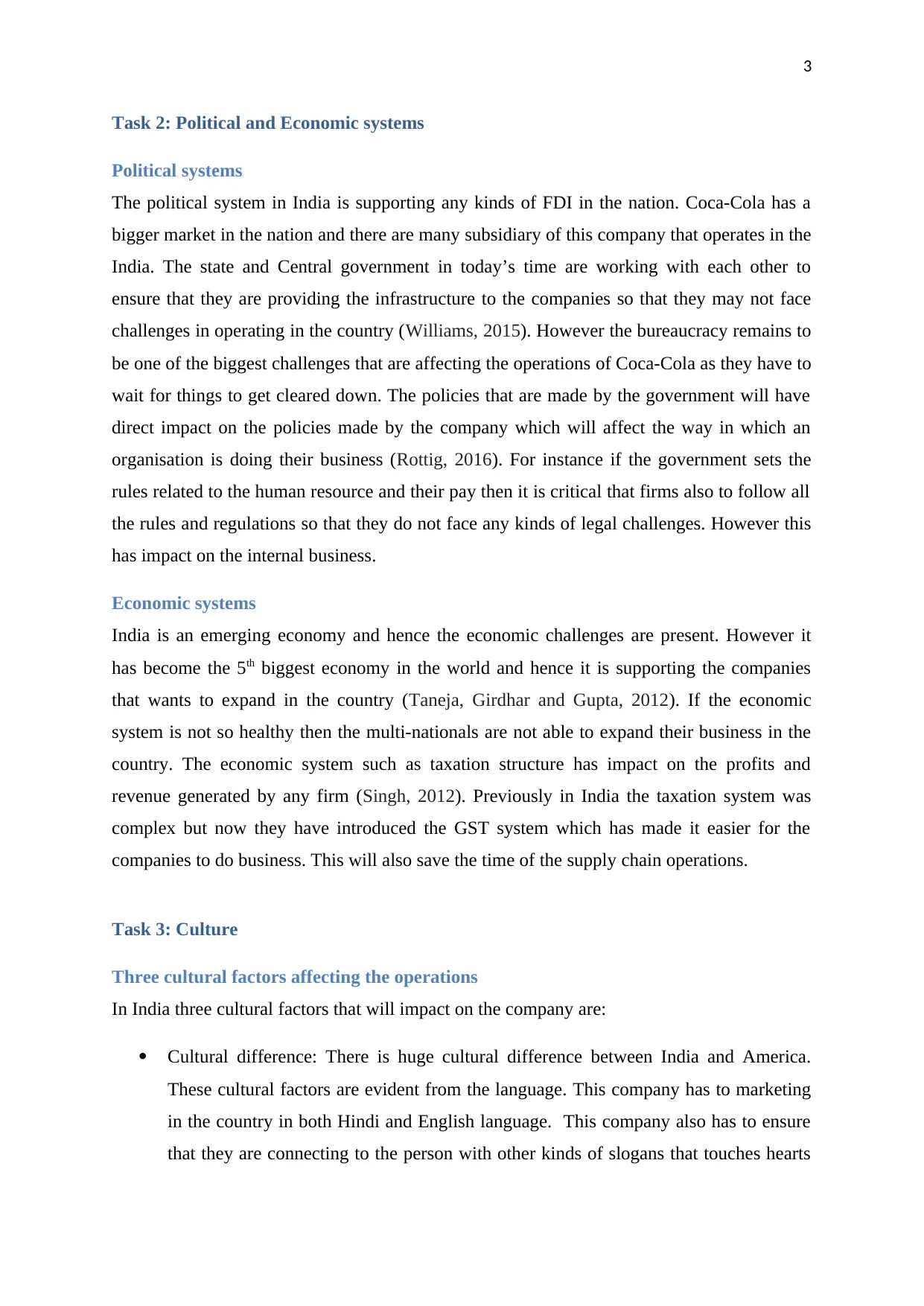
3
Task 2: Political and Economic systems
Political systems
The political system in India is supporting any kinds of FDI in the nation. Coca-Cola has a
bigger market in the nation and there are many subsidiary of this company that operates in the
India. The state and Central government in today’s time are working with each other to
ensure that they are providing the infrastructure to the companies so that they may not face
challenges in operating in the country (Williams, 2015). However the bureaucracy remains to
be one of the biggest challenges that are affecting the operations of Coca-Cola as they have to
wait for things to get cleared down. The policies that are made by the government will have
direct impact on the policies made by the company which will affect the way in which an
organisation is doing their business (Rottig, 2016). For instance if the government sets the
rules related to the human resource and their pay then it is critical that firms also to follow all
the rules and regulations so that they do not face any kinds of legal challenges. However this
has impact on the internal business.
Economic systems
India is an emerging economy and hence the economic challenges are present. However it
has become the 5th biggest economy in the world and hence it is supporting the companies
that wants to expand in the country (Taneja, Girdhar and Gupta, 2012). If the economic
system is not so healthy then the multi-nationals are not able to expand their business in the
country. The economic system such as taxation structure has impact on the profits and
revenue generated by any firm (Singh, 2012). Previously in India the taxation system was
complex but now they have introduced the GST system which has made it easier for the
companies to do business. This will also save the time of the supply chain operations.
Task 3: Culture
Three cultural factors affecting the operations
In India three cultural factors that will impact on the company are:
Cultural difference: There is huge cultural difference between India and America.
These cultural factors are evident from the language. This company has to marketing
in the country in both Hindi and English language. This company also has to ensure
that they are connecting to the person with other kinds of slogans that touches hearts
Task 2: Political and Economic systems
Political systems
The political system in India is supporting any kinds of FDI in the nation. Coca-Cola has a
bigger market in the nation and there are many subsidiary of this company that operates in the
India. The state and Central government in today’s time are working with each other to
ensure that they are providing the infrastructure to the companies so that they may not face
challenges in operating in the country (Williams, 2015). However the bureaucracy remains to
be one of the biggest challenges that are affecting the operations of Coca-Cola as they have to
wait for things to get cleared down. The policies that are made by the government will have
direct impact on the policies made by the company which will affect the way in which an
organisation is doing their business (Rottig, 2016). For instance if the government sets the
rules related to the human resource and their pay then it is critical that firms also to follow all
the rules and regulations so that they do not face any kinds of legal challenges. However this
has impact on the internal business.
Economic systems
India is an emerging economy and hence the economic challenges are present. However it
has become the 5th biggest economy in the world and hence it is supporting the companies
that wants to expand in the country (Taneja, Girdhar and Gupta, 2012). If the economic
system is not so healthy then the multi-nationals are not able to expand their business in the
country. The economic system such as taxation structure has impact on the profits and
revenue generated by any firm (Singh, 2012). Previously in India the taxation system was
complex but now they have introduced the GST system which has made it easier for the
companies to do business. This will also save the time of the supply chain operations.
Task 3: Culture
Three cultural factors affecting the operations
In India three cultural factors that will impact on the company are:
Cultural difference: There is huge cultural difference between India and America.
These cultural factors are evident from the language. This company has to marketing
in the country in both Hindi and English language. This company also has to ensure
that they are connecting to the person with other kinds of slogans that touches hearts
Paraphrase This Document
Need a fresh take? Get an instant paraphrase of this document with our AI Paraphraser
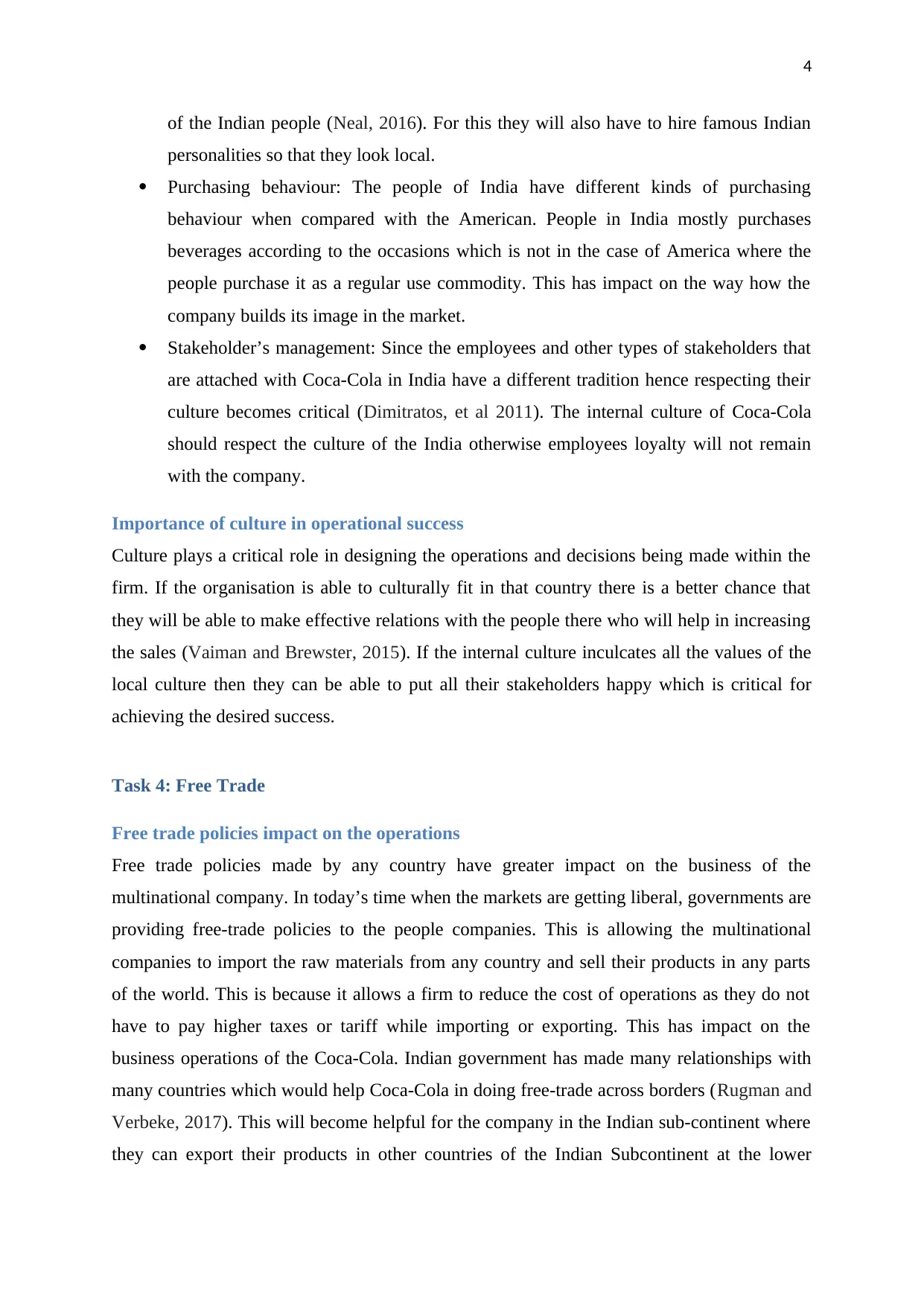
4
of the Indian people (Neal, 2016). For this they will also have to hire famous Indian
personalities so that they look local.
Purchasing behaviour: The people of India have different kinds of purchasing
behaviour when compared with the American. People in India mostly purchases
beverages according to the occasions which is not in the case of America where the
people purchase it as a regular use commodity. This has impact on the way how the
company builds its image in the market.
Stakeholder’s management: Since the employees and other types of stakeholders that
are attached with Coca-Cola in India have a different tradition hence respecting their
culture becomes critical (Dimitratos, et al 2011). The internal culture of Coca-Cola
should respect the culture of the India otherwise employees loyalty will not remain
with the company.
Importance of culture in operational success
Culture plays a critical role in designing the operations and decisions being made within the
firm. If the organisation is able to culturally fit in that country there is a better chance that
they will be able to make effective relations with the people there who will help in increasing
the sales (Vaiman and Brewster, 2015). If the internal culture inculcates all the values of the
local culture then they can be able to put all their stakeholders happy which is critical for
achieving the desired success.
Task 4: Free Trade
Free trade policies impact on the operations
Free trade policies made by any country have greater impact on the business of the
multinational company. In today’s time when the markets are getting liberal, governments are
providing free-trade policies to the people companies. This is allowing the multinational
companies to import the raw materials from any country and sell their products in any parts
of the world. This is because it allows a firm to reduce the cost of operations as they do not
have to pay higher taxes or tariff while importing or exporting. This has impact on the
business operations of the Coca-Cola. Indian government has made many relationships with
many countries which would help Coca-Cola in doing free-trade across borders (Rugman and
Verbeke, 2017). This will become helpful for the company in the Indian sub-continent where
they can export their products in other countries of the Indian Subcontinent at the lower
of the Indian people (Neal, 2016). For this they will also have to hire famous Indian
personalities so that they look local.
Purchasing behaviour: The people of India have different kinds of purchasing
behaviour when compared with the American. People in India mostly purchases
beverages according to the occasions which is not in the case of America where the
people purchase it as a regular use commodity. This has impact on the way how the
company builds its image in the market.
Stakeholder’s management: Since the employees and other types of stakeholders that
are attached with Coca-Cola in India have a different tradition hence respecting their
culture becomes critical (Dimitratos, et al 2011). The internal culture of Coca-Cola
should respect the culture of the India otherwise employees loyalty will not remain
with the company.
Importance of culture in operational success
Culture plays a critical role in designing the operations and decisions being made within the
firm. If the organisation is able to culturally fit in that country there is a better chance that
they will be able to make effective relations with the people there who will help in increasing
the sales (Vaiman and Brewster, 2015). If the internal culture inculcates all the values of the
local culture then they can be able to put all their stakeholders happy which is critical for
achieving the desired success.
Task 4: Free Trade
Free trade policies impact on the operations
Free trade policies made by any country have greater impact on the business of the
multinational company. In today’s time when the markets are getting liberal, governments are
providing free-trade policies to the people companies. This is allowing the multinational
companies to import the raw materials from any country and sell their products in any parts
of the world. This is because it allows a firm to reduce the cost of operations as they do not
have to pay higher taxes or tariff while importing or exporting. This has impact on the
business operations of the Coca-Cola. Indian government has made many relationships with
many countries which would help Coca-Cola in doing free-trade across borders (Rugman and
Verbeke, 2017). This will become helpful for the company in the Indian sub-continent where
they can export their products in other countries of the Indian Subcontinent at the lower
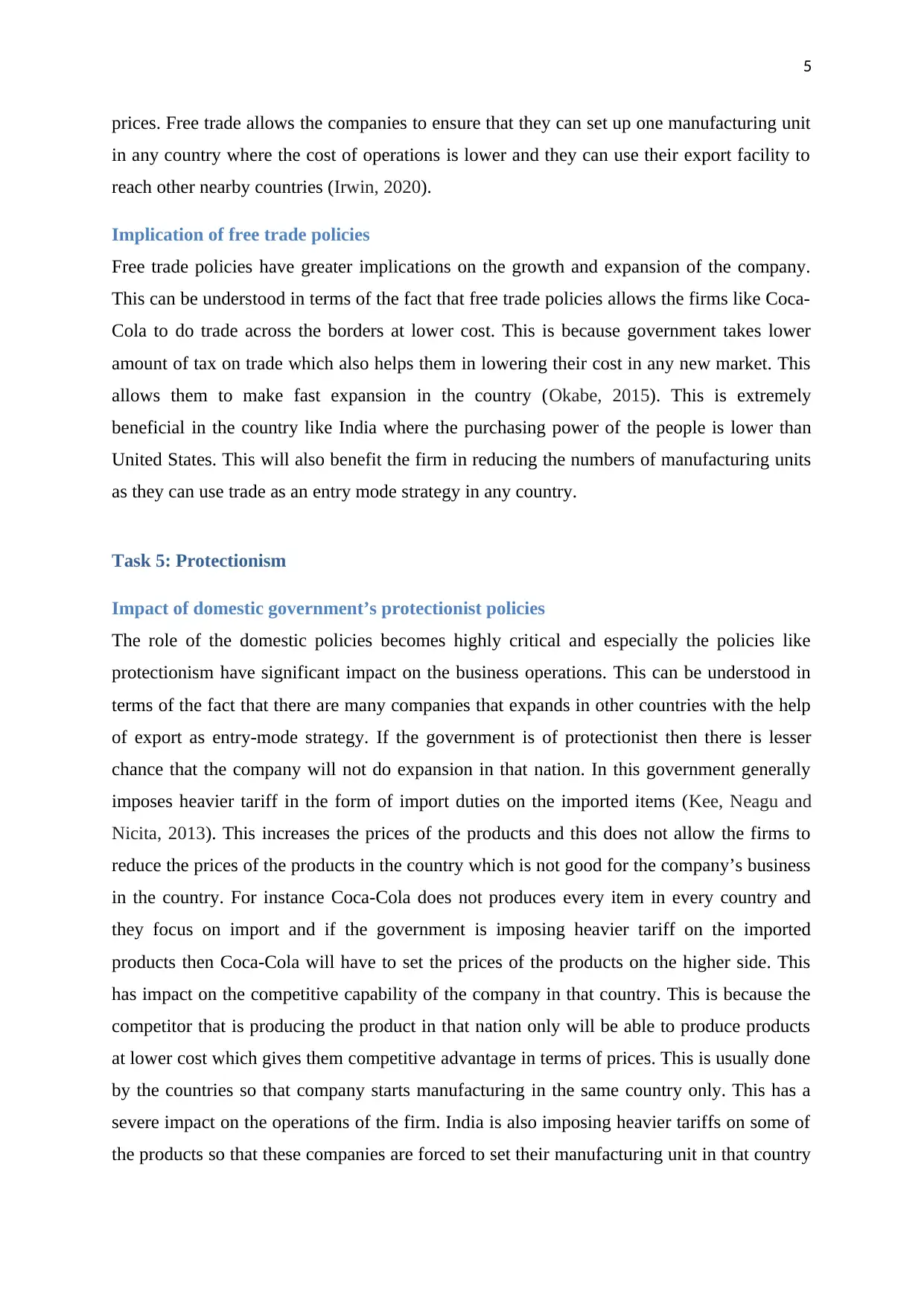
5
prices. Free trade allows the companies to ensure that they can set up one manufacturing unit
in any country where the cost of operations is lower and they can use their export facility to
reach other nearby countries (Irwin, 2020).
Implication of free trade policies
Free trade policies have greater implications on the growth and expansion of the company.
This can be understood in terms of the fact that free trade policies allows the firms like Coca-
Cola to do trade across the borders at lower cost. This is because government takes lower
amount of tax on trade which also helps them in lowering their cost in any new market. This
allows them to make fast expansion in the country (Okabe, 2015). This is extremely
beneficial in the country like India where the purchasing power of the people is lower than
United States. This will also benefit the firm in reducing the numbers of manufacturing units
as they can use trade as an entry mode strategy in any country.
Task 5: Protectionism
Impact of domestic government’s protectionist policies
The role of the domestic policies becomes highly critical and especially the policies like
protectionism have significant impact on the business operations. This can be understood in
terms of the fact that there are many companies that expands in other countries with the help
of export as entry-mode strategy. If the government is of protectionist then there is lesser
chance that the company will not do expansion in that nation. In this government generally
imposes heavier tariff in the form of import duties on the imported items (Kee, Neagu and
Nicita, 2013). This increases the prices of the products and this does not allow the firms to
reduce the prices of the products in the country which is not good for the company’s business
in the country. For instance Coca-Cola does not produces every item in every country and
they focus on import and if the government is imposing heavier tariff on the imported
products then Coca-Cola will have to set the prices of the products on the higher side. This
has impact on the competitive capability of the company in that country. This is because the
competitor that is producing the product in that nation only will be able to produce products
at lower cost which gives them competitive advantage in terms of prices. This is usually done
by the countries so that company starts manufacturing in the same country only. This has a
severe impact on the operations of the firm. India is also imposing heavier tariffs on some of
the products so that these companies are forced to set their manufacturing unit in that country
prices. Free trade allows the companies to ensure that they can set up one manufacturing unit
in any country where the cost of operations is lower and they can use their export facility to
reach other nearby countries (Irwin, 2020).
Implication of free trade policies
Free trade policies have greater implications on the growth and expansion of the company.
This can be understood in terms of the fact that free trade policies allows the firms like Coca-
Cola to do trade across the borders at lower cost. This is because government takes lower
amount of tax on trade which also helps them in lowering their cost in any new market. This
allows them to make fast expansion in the country (Okabe, 2015). This is extremely
beneficial in the country like India where the purchasing power of the people is lower than
United States. This will also benefit the firm in reducing the numbers of manufacturing units
as they can use trade as an entry mode strategy in any country.
Task 5: Protectionism
Impact of domestic government’s protectionist policies
The role of the domestic policies becomes highly critical and especially the policies like
protectionism have significant impact on the business operations. This can be understood in
terms of the fact that there are many companies that expands in other countries with the help
of export as entry-mode strategy. If the government is of protectionist then there is lesser
chance that the company will not do expansion in that nation. In this government generally
imposes heavier tariff in the form of import duties on the imported items (Kee, Neagu and
Nicita, 2013). This increases the prices of the products and this does not allow the firms to
reduce the prices of the products in the country which is not good for the company’s business
in the country. For instance Coca-Cola does not produces every item in every country and
they focus on import and if the government is imposing heavier tariff on the imported
products then Coca-Cola will have to set the prices of the products on the higher side. This
has impact on the competitive capability of the company in that country. This is because the
competitor that is producing the product in that nation only will be able to produce products
at lower cost which gives them competitive advantage in terms of prices. This is usually done
by the countries so that company starts manufacturing in the same country only. This has a
severe impact on the operations of the firm. India is also imposing heavier tariffs on some of
the products so that these companies are forced to set their manufacturing unit in that country
⊘ This is a preview!⊘
Do you want full access?
Subscribe today to unlock all pages.

Trusted by 1+ million students worldwide
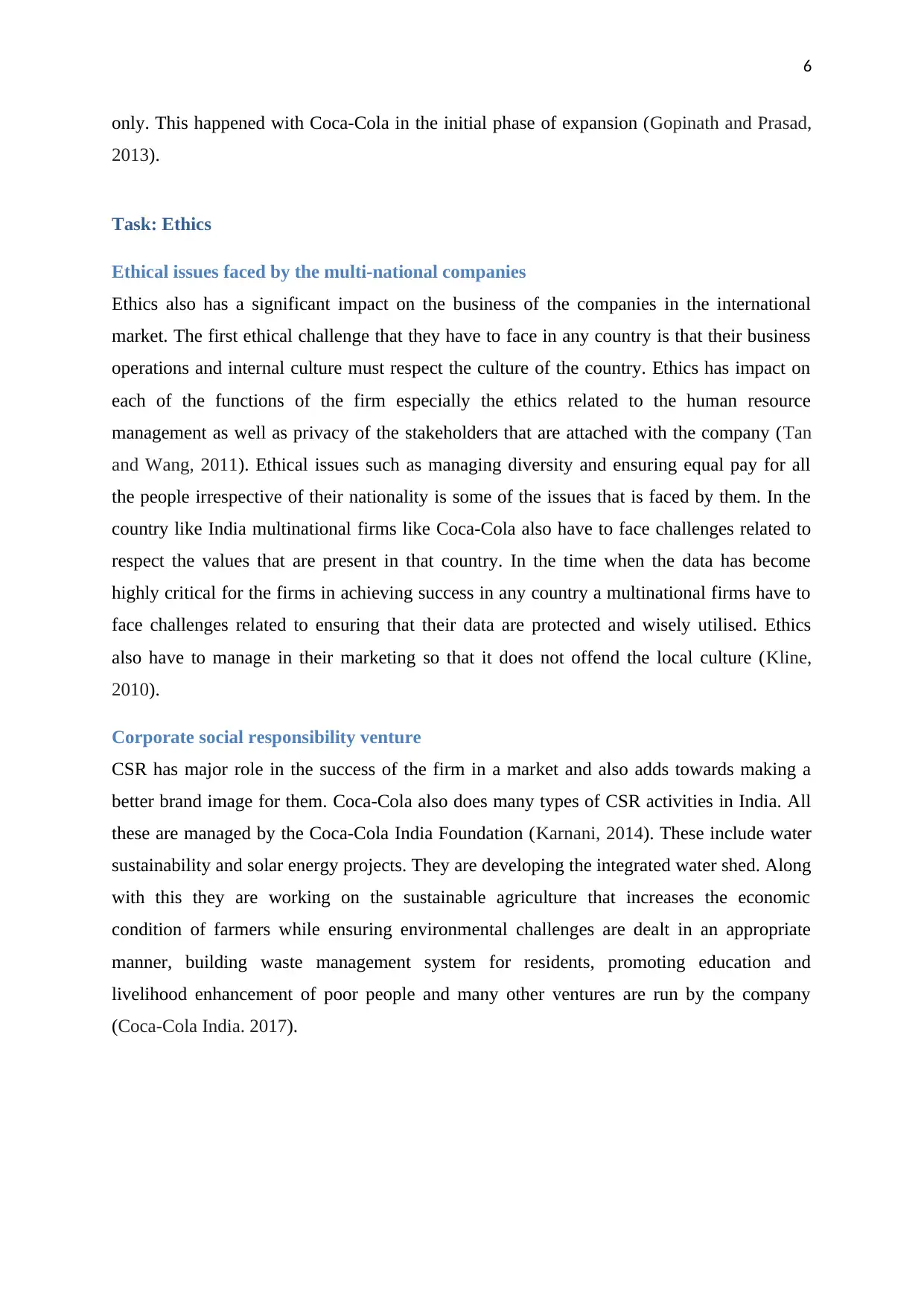
6
only. This happened with Coca-Cola in the initial phase of expansion (Gopinath and Prasad,
2013).
Task: Ethics
Ethical issues faced by the multi-national companies
Ethics also has a significant impact on the business of the companies in the international
market. The first ethical challenge that they have to face in any country is that their business
operations and internal culture must respect the culture of the country. Ethics has impact on
each of the functions of the firm especially the ethics related to the human resource
management as well as privacy of the stakeholders that are attached with the company (Tan
and Wang, 2011). Ethical issues such as managing diversity and ensuring equal pay for all
the people irrespective of their nationality is some of the issues that is faced by them. In the
country like India multinational firms like Coca-Cola also have to face challenges related to
respect the values that are present in that country. In the time when the data has become
highly critical for the firms in achieving success in any country a multinational firms have to
face challenges related to ensuring that their data are protected and wisely utilised. Ethics
also have to manage in their marketing so that it does not offend the local culture (Kline,
2010).
Corporate social responsibility venture
CSR has major role in the success of the firm in a market and also adds towards making a
better brand image for them. Coca-Cola also does many types of CSR activities in India. All
these are managed by the Coca-Cola India Foundation (Karnani, 2014). These include water
sustainability and solar energy projects. They are developing the integrated water shed. Along
with this they are working on the sustainable agriculture that increases the economic
condition of farmers while ensuring environmental challenges are dealt in an appropriate
manner, building waste management system for residents, promoting education and
livelihood enhancement of poor people and many other ventures are run by the company
(Coca-Cola India. 2017).
only. This happened with Coca-Cola in the initial phase of expansion (Gopinath and Prasad,
2013).
Task: Ethics
Ethical issues faced by the multi-national companies
Ethics also has a significant impact on the business of the companies in the international
market. The first ethical challenge that they have to face in any country is that their business
operations and internal culture must respect the culture of the country. Ethics has impact on
each of the functions of the firm especially the ethics related to the human resource
management as well as privacy of the stakeholders that are attached with the company (Tan
and Wang, 2011). Ethical issues such as managing diversity and ensuring equal pay for all
the people irrespective of their nationality is some of the issues that is faced by them. In the
country like India multinational firms like Coca-Cola also have to face challenges related to
respect the values that are present in that country. In the time when the data has become
highly critical for the firms in achieving success in any country a multinational firms have to
face challenges related to ensuring that their data are protected and wisely utilised. Ethics
also have to manage in their marketing so that it does not offend the local culture (Kline,
2010).
Corporate social responsibility venture
CSR has major role in the success of the firm in a market and also adds towards making a
better brand image for them. Coca-Cola also does many types of CSR activities in India. All
these are managed by the Coca-Cola India Foundation (Karnani, 2014). These include water
sustainability and solar energy projects. They are developing the integrated water shed. Along
with this they are working on the sustainable agriculture that increases the economic
condition of farmers while ensuring environmental challenges are dealt in an appropriate
manner, building waste management system for residents, promoting education and
livelihood enhancement of poor people and many other ventures are run by the company
(Coca-Cola India. 2017).
Paraphrase This Document
Need a fresh take? Get an instant paraphrase of this document with our AI Paraphraser
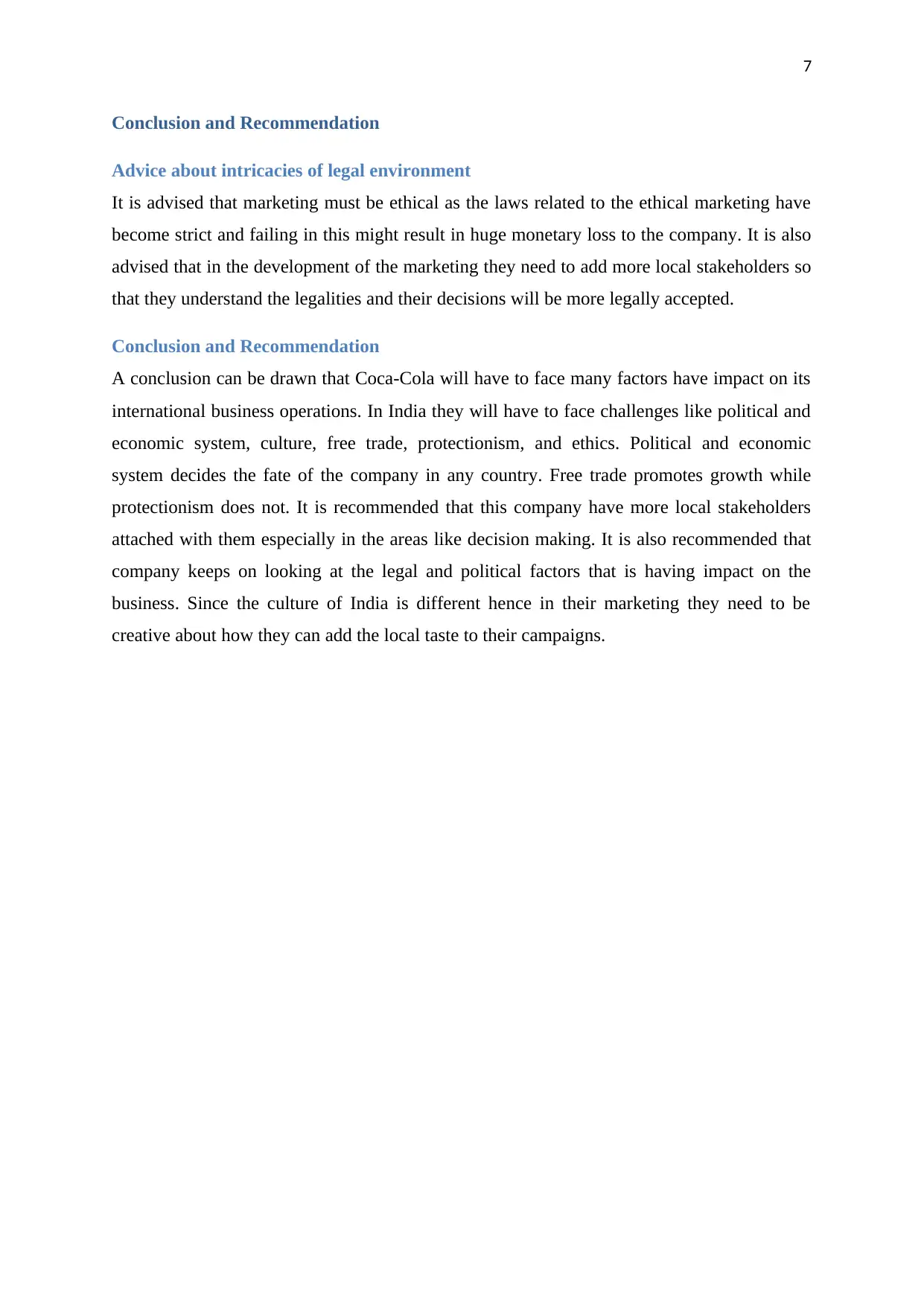
7
Conclusion and Recommendation
Advice about intricacies of legal environment
It is advised that marketing must be ethical as the laws related to the ethical marketing have
become strict and failing in this might result in huge monetary loss to the company. It is also
advised that in the development of the marketing they need to add more local stakeholders so
that they understand the legalities and their decisions will be more legally accepted.
Conclusion and Recommendation
A conclusion can be drawn that Coca-Cola will have to face many factors have impact on its
international business operations. In India they will have to face challenges like political and
economic system, culture, free trade, protectionism, and ethics. Political and economic
system decides the fate of the company in any country. Free trade promotes growth while
protectionism does not. It is recommended that this company have more local stakeholders
attached with them especially in the areas like decision making. It is also recommended that
company keeps on looking at the legal and political factors that is having impact on the
business. Since the culture of India is different hence in their marketing they need to be
creative about how they can add the local taste to their campaigns.
Conclusion and Recommendation
Advice about intricacies of legal environment
It is advised that marketing must be ethical as the laws related to the ethical marketing have
become strict and failing in this might result in huge monetary loss to the company. It is also
advised that in the development of the marketing they need to add more local stakeholders so
that they understand the legalities and their decisions will be more legally accepted.
Conclusion and Recommendation
A conclusion can be drawn that Coca-Cola will have to face many factors have impact on its
international business operations. In India they will have to face challenges like political and
economic system, culture, free trade, protectionism, and ethics. Political and economic
system decides the fate of the company in any country. Free trade promotes growth while
protectionism does not. It is recommended that this company have more local stakeholders
attached with them especially in the areas like decision making. It is also recommended that
company keeps on looking at the legal and political factors that is having impact on the
business. Since the culture of India is different hence in their marketing they need to be
creative about how they can add the local taste to their campaigns.
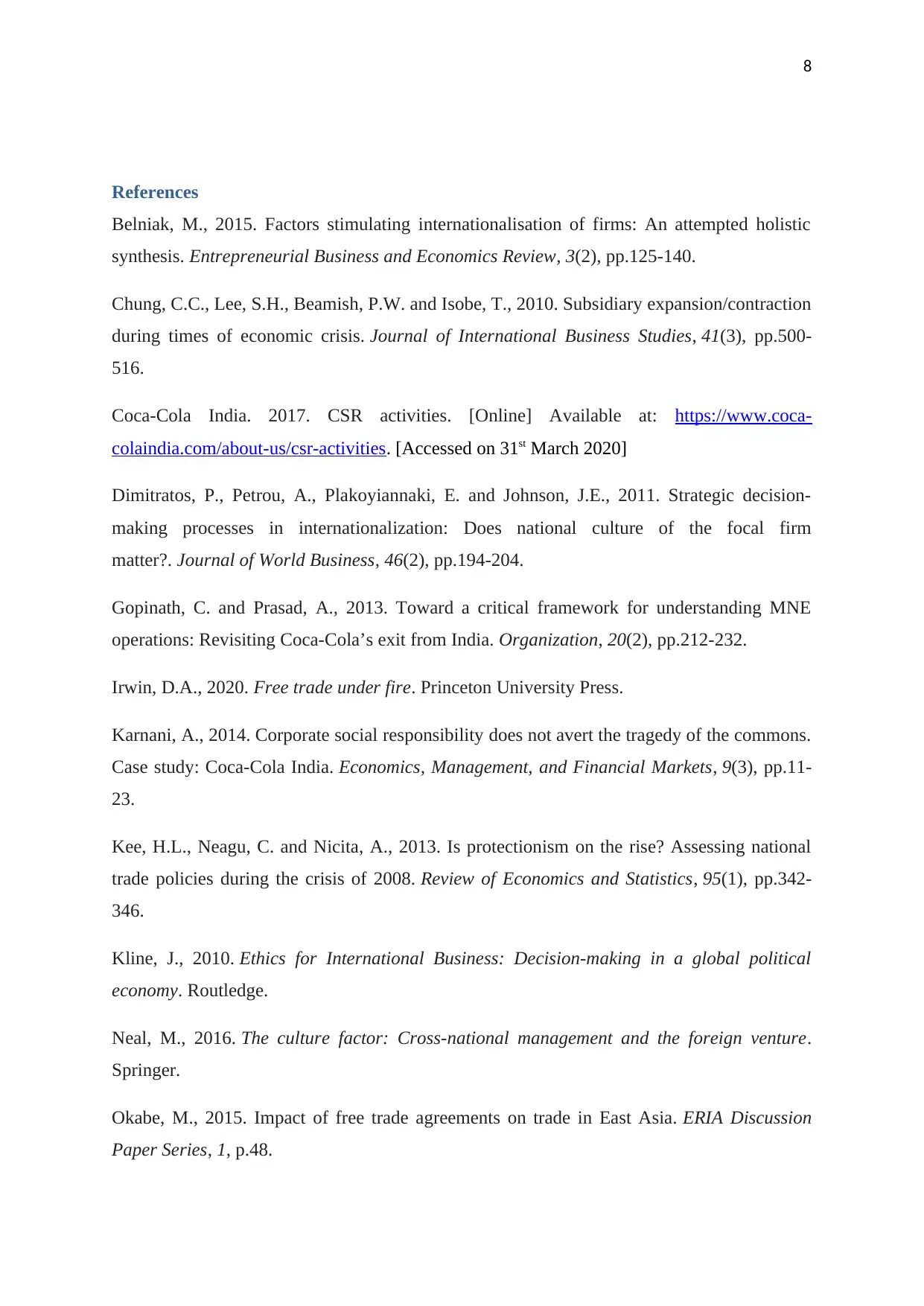
8
References
Belniak, M., 2015. Factors stimulating internationalisation of firms: An attempted holistic
synthesis. Entrepreneurial Business and Economics Review, 3(2), pp.125-140.
Chung, C.C., Lee, S.H., Beamish, P.W. and Isobe, T., 2010. Subsidiary expansion/contraction
during times of economic crisis. Journal of International Business Studies, 41(3), pp.500-
516.
Coca-Cola India. 2017. CSR activities. [Online] Available at: https://www.coca-
colaindia.com/about-us/csr-activities. [Accessed on 31st March 2020]
Dimitratos, P., Petrou, A., Plakoyiannaki, E. and Johnson, J.E., 2011. Strategic decision-
making processes in internationalization: Does national culture of the focal firm
matter?. Journal of World Business, 46(2), pp.194-204.
Gopinath, C. and Prasad, A., 2013. Toward a critical framework for understanding MNE
operations: Revisiting Coca-Cola’s exit from India. Organization, 20(2), pp.212-232.
Irwin, D.A., 2020. Free trade under fire. Princeton University Press.
Karnani, A., 2014. Corporate social responsibility does not avert the tragedy of the commons.
Case study: Coca-Cola India. Economics, Management, and Financial Markets, 9(3), pp.11-
23.
Kee, H.L., Neagu, C. and Nicita, A., 2013. Is protectionism on the rise? Assessing national
trade policies during the crisis of 2008. Review of Economics and Statistics, 95(1), pp.342-
346.
Kline, J., 2010. Ethics for International Business: Decision-making in a global political
economy. Routledge.
Neal, M., 2016. The culture factor: Cross-national management and the foreign venture.
Springer.
Okabe, M., 2015. Impact of free trade agreements on trade in East Asia. ERIA Discussion
Paper Series, 1, p.48.
References
Belniak, M., 2015. Factors stimulating internationalisation of firms: An attempted holistic
synthesis. Entrepreneurial Business and Economics Review, 3(2), pp.125-140.
Chung, C.C., Lee, S.H., Beamish, P.W. and Isobe, T., 2010. Subsidiary expansion/contraction
during times of economic crisis. Journal of International Business Studies, 41(3), pp.500-
516.
Coca-Cola India. 2017. CSR activities. [Online] Available at: https://www.coca-
colaindia.com/about-us/csr-activities. [Accessed on 31st March 2020]
Dimitratos, P., Petrou, A., Plakoyiannaki, E. and Johnson, J.E., 2011. Strategic decision-
making processes in internationalization: Does national culture of the focal firm
matter?. Journal of World Business, 46(2), pp.194-204.
Gopinath, C. and Prasad, A., 2013. Toward a critical framework for understanding MNE
operations: Revisiting Coca-Cola’s exit from India. Organization, 20(2), pp.212-232.
Irwin, D.A., 2020. Free trade under fire. Princeton University Press.
Karnani, A., 2014. Corporate social responsibility does not avert the tragedy of the commons.
Case study: Coca-Cola India. Economics, Management, and Financial Markets, 9(3), pp.11-
23.
Kee, H.L., Neagu, C. and Nicita, A., 2013. Is protectionism on the rise? Assessing national
trade policies during the crisis of 2008. Review of Economics and Statistics, 95(1), pp.342-
346.
Kline, J., 2010. Ethics for International Business: Decision-making in a global political
economy. Routledge.
Neal, M., 2016. The culture factor: Cross-national management and the foreign venture.
Springer.
Okabe, M., 2015. Impact of free trade agreements on trade in East Asia. ERIA Discussion
Paper Series, 1, p.48.
⊘ This is a preview!⊘
Do you want full access?
Subscribe today to unlock all pages.

Trusted by 1+ million students worldwide
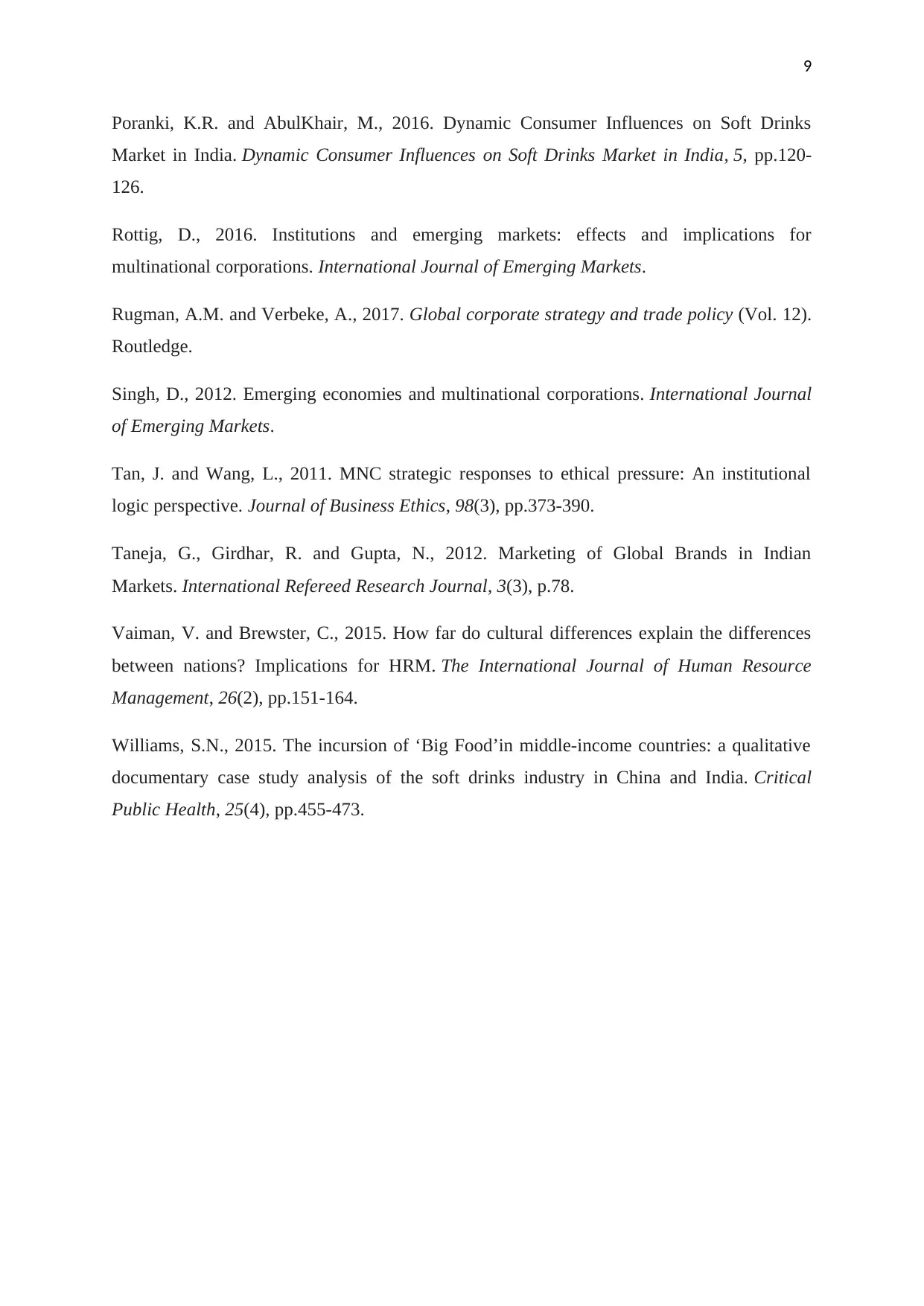
9
Poranki, K.R. and AbulKhair, M., 2016. Dynamic Consumer Influences on Soft Drinks
Market in India. Dynamic Consumer Influences on Soft Drinks Market in India, 5, pp.120-
126.
Rottig, D., 2016. Institutions and emerging markets: effects and implications for
multinational corporations. International Journal of Emerging Markets.
Rugman, A.M. and Verbeke, A., 2017. Global corporate strategy and trade policy (Vol. 12).
Routledge.
Singh, D., 2012. Emerging economies and multinational corporations. International Journal
of Emerging Markets.
Tan, J. and Wang, L., 2011. MNC strategic responses to ethical pressure: An institutional
logic perspective. Journal of Business Ethics, 98(3), pp.373-390.
Taneja, G., Girdhar, R. and Gupta, N., 2012. Marketing of Global Brands in Indian
Markets. International Refereed Research Journal, 3(3), p.78.
Vaiman, V. and Brewster, C., 2015. How far do cultural differences explain the differences
between nations? Implications for HRM. The International Journal of Human Resource
Management, 26(2), pp.151-164.
Williams, S.N., 2015. The incursion of ‘Big Food’in middle-income countries: a qualitative
documentary case study analysis of the soft drinks industry in China and India. Critical
Public Health, 25(4), pp.455-473.
Poranki, K.R. and AbulKhair, M., 2016. Dynamic Consumer Influences on Soft Drinks
Market in India. Dynamic Consumer Influences on Soft Drinks Market in India, 5, pp.120-
126.
Rottig, D., 2016. Institutions and emerging markets: effects and implications for
multinational corporations. International Journal of Emerging Markets.
Rugman, A.M. and Verbeke, A., 2017. Global corporate strategy and trade policy (Vol. 12).
Routledge.
Singh, D., 2012. Emerging economies and multinational corporations. International Journal
of Emerging Markets.
Tan, J. and Wang, L., 2011. MNC strategic responses to ethical pressure: An institutional
logic perspective. Journal of Business Ethics, 98(3), pp.373-390.
Taneja, G., Girdhar, R. and Gupta, N., 2012. Marketing of Global Brands in Indian
Markets. International Refereed Research Journal, 3(3), p.78.
Vaiman, V. and Brewster, C., 2015. How far do cultural differences explain the differences
between nations? Implications for HRM. The International Journal of Human Resource
Management, 26(2), pp.151-164.
Williams, S.N., 2015. The incursion of ‘Big Food’in middle-income countries: a qualitative
documentary case study analysis of the soft drinks industry in China and India. Critical
Public Health, 25(4), pp.455-473.
1 out of 10
Related Documents
Your All-in-One AI-Powered Toolkit for Academic Success.
+13062052269
info@desklib.com
Available 24*7 on WhatsApp / Email
![[object Object]](/_next/static/media/star-bottom.7253800d.svg)
Unlock your academic potential
Copyright © 2020–2026 A2Z Services. All Rights Reserved. Developed and managed by ZUCOL.





